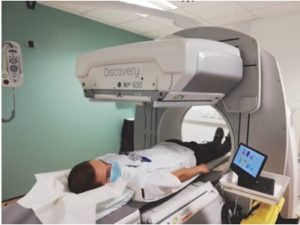Download and print as a PDF (251kB pdf)
On this page
What is a MAG3 renogram?
A renogram is an examination which looks at the function of your kidneys. MAG3 is the chemical name of the radioactive substance we use to image the kidneys.
Can I have a MAG3 if I am pregnant or breastfeeding?
If there is a possibility that you are pregnant or you are currently breastfeeding please inform the department before your appointment.
Can I bring someone with me?
Whenever possible, only the patient should attend their appointment unless you are a parent accompanying a child or a carer for a patient with additional needs.
What will happen at my appointment?
Before attending for your appointment, you are required to drink plenty of fluid, to ensure you are well hydrated. It is not necessary to have a full bladder though, so empty your bladder as required.
Sometimes you may need to have a diuretic before the scan. A diuretic is a drug that makes your kidneys work harder and maximises kidney function. It is given by an injection into a vein, normally in your arm or the back of your hand. It may cause you to feel that you need to empty your bladder more frequently.
We then allow 15 minutes for this to start working before starting your scan. In this time you can use the toilet as required.
For your scan, you will be lying on the imaging bed with the gamma camera positioned below you (the upper camera head usually stays at a distance from you). You do not normally have to undress but we will ask you to remove any heavy or metal objects such a belt.
The radioactive liquid (MAG3) will then be injected into a vein in your arm or the back of the hand. This will not make you feel any different. The scan will be started immediately.
The scan takes about 25 minutes and it is important that you remain still for this time. We will then ask you to go and empty your bladder and when you return we will take another image for one minute.

Sometimes it is necessary to take further images after 30 minutes, so please allow time when coming for your appointment.
If you have young children or pregnant friends/family please limit close contact with them for the rest of the day. You can be in the same room but avoid sitting close to each other for long periods.
What will happen after my appointment?
After the appointment you can resume all usual activities. Eat as normal and keep well hydrated.
When will I get my results?
The report will be sent to your referring doctor. They will contact you to discuss the results. If you have any enquiries regarding your results please contact the department where the referral was originally made.
Are there any risks?
The radioactive tracer administered will expose you to a small amount of ionising radiation, consistent with the desired diagnostic outcome. The risks are very low and the benefits of having the results from the MAG3 scan greatly outweigh the risk.
Contact details
Royal Sussex County Hospital (RSCH)
Louisa Martindale Building,
Royal Sussex County Hospital
Eastern Road
Brighton BN2 5BE
Nuclear Medicine Department
01273 696955
Ext. 64381 or 64382
Disclaimer
This leaflet is intended for patients receiving care in Brighton & Hove or Haywards Heath.
The information in this leaflet is for guidance purposes only and is in no way intended to replace professional clinical advice by a qualified practitioner.